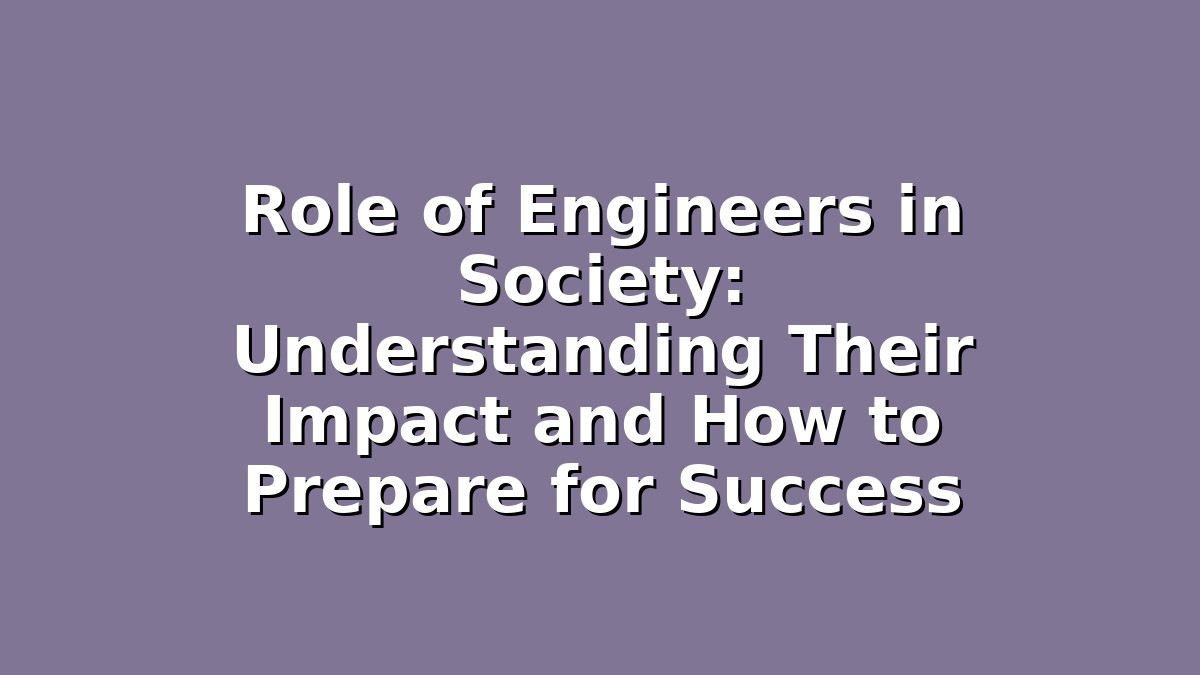Introduction
Engineering is much more than just solving math problems or building machines; it is a powerful force that shapes the world we live in. For students preparing for exams or seeking effective study tips, understanding the role of engineers in society can provide motivation and context that make learning more meaningful. Engineers design the infrastructure that supports daily life, develop innovative technologies that improve health and safety, and contribute to sustainable solutions that protect our planet. This article explores the multifaceted role of engineers in society and offers practical study advice to help students excel in their engineering or science-related exams.
Section 1: How Engineers Build and Improve Our World
Engineers are the architects of modern civilization. They design, construct, and maintain the systems and structures that we rely on every day—from bridges and roads to water supply and electrical grids. Civil engineers, for instance, ensure that buildings are safe and can withstand natural disasters, while environmental engineers work to reduce pollution and manage waste effectively.
For students studying engineering subjects, connecting theory to these real-world applications makes the material more engaging. To deepen your understanding:
– Use real-life examples: When revising topics like forces, materials, or energy, think about how these principles apply to building a bridge or a dam.
– Visualize concepts: Sketch diagrams or watch videos of engineering projects to see abstract ideas come to life.
– Practice problem-solving: Work on past exam questions or case studies that involve designing or analyzing structures.
By seeing the impact of engineering work, students can stay motivated and appreciate the relevance of their studies.
Section 2: Engineers as Innovators and Problem Solvers
Beyond infrastructure, engineers are innovators who create new technologies that solve complex problems. Whether it’s developing medical devices, improving renewable energy systems, or advancing computer software, engineers use creativity and critical thinking to push boundaries.
To develop these skills in your studies:
– Engage in project-based learning: If possible, participate in school clubs or online courses that require designing a project or prototype.
– Break down problems: Practice analyzing questions by identifying what is given and what needs to be found, then plan your approach step-by-step.
– Collaborate and communicate: Work with peers to discuss ideas and solutions, as teamwork is essential in engineering fields.
Fostering an innovative mindset will not only help you tackle exam questions but also prepare you for real-life engineering challenges.
Section 3: Engineers and Sustainable Development
With growing concerns about climate change and resource depletion, engineers play a crucial role in creating sustainable solutions. They develop renewable energy technologies, design environmentally friendly buildings, and optimize manufacturing to reduce waste.
Students can incorporate sustainability into their learning by:
– Studying current events: Follow news about green technologies and consider how engineering contributes.
– Exploring interdisciplinary topics: Understand how engineering intersects with environmental science, economics, and social responsibility.
– Reflecting on ethical considerations: Think about the broader impact of engineering decisions on society and the planet.
Adopting this perspective encourages responsible thinking and highlights the importance of engineers as stewards of the future.
Conclusion
The role of engineers in society is vast and impactful. They build the foundations of safe communities, innovate to improve quality of life, and lead efforts for a sustainable future. For students preparing for exams, recognizing these contributions can inspire a more focused and purposeful study routine. By connecting lessons to real-world applications, practicing creative problem-solving, and considering the ethical dimensions of engineering, you can not only succeed academically but also prepare to become a valuable contributor to society.
Remember, every great engineer started as a student just like you—curious, determined, and eager to make a difference. Keep your goals in sight, break your study sessions into manageable parts, and don’t hesitate to seek support when needed. Your hard work today lays the groundwork for the innovations of tomorrow.

Responses